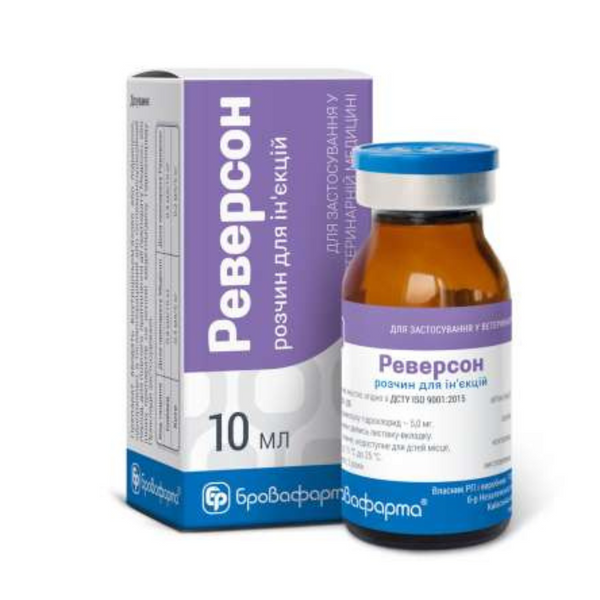|
Quantity
|
Out of stock
|
||
|
|
|||
Storage
1 ml of the drug contains:
atipamezole hydrochloride — 5 mg
Description
The liquid is colorless, transparent.
Pharmacological properties
Atipamezole hydrochloride is a selective blocker of alpha-2-adrenergic receptors that stimulates the release of norepinephrine, which is the main neurotransmitter in the central and peripheral nervous system. This leads to stimulation, excitation of the sympathetic nervous system, stops the sedative, analgesic effect and other effects on the cardiovascular and respiratory systems of medetomidine hydrochloride or dexmedetomidine hydrochloride. After intramuscular administration, it is quickly absorbed, the maximum concentration in blood plasma is reached after 10-15 minutes. The volume of distribution (Vd) is 1-2.5 l/kg, the half-life is 2-3 hours.
It is metabolized in the liver, a small amount is methylated in the kidneys. Metabolites are excreted mainly with urine.
Indication
It is used in dogs and cats to completely stop the sedative, analgesic and side effects on the cardiovascular and respiratory systems of drugs such as Madison and other drugs based on medetomidine hydrochloride.
Contraindication
Do not use in animals with increased sensitivity to the active substance of the drug, pregnant, lactating and productive animals.
Storage conditions
In a dry, dark place inaccessible to children at a temperature of +15 to +25 °C.
After opening the bottle, the drug should be used within 28 days.
Expiration date
2 years.
Method of application and dosage
The drug is administered intramuscularly or subcutaneously, once, after surgery or other manipulations.
The optimal dose of Reverson correlates with the volume of the previously administered drug Madison or other means based on medetomidine hydrochloride as follows: for dogs — 1:1, for cats — 1:2 (the dose of Reverson is two times less than the dose of Madison).
Examples of calculating doses for different species of animals are shown in the table.
Animal species Madison Reverson
Dogs 0.4 ml per 10 kg of body weight 0.4 ml per 10 kg of body weight
Cats 0.4 ml per 5 kg of body weight 0.2 ml per 5 kg of body weight
Reverson quickly returns the animal to full consciousness and reduces the period of possible cardiovascular depression and hypothermia.
Usually, the drug begins to act 5-10 minutes after administration. If the animal continues to be in a depressed state, Reverson can be re-injected in the same dose 10-15 minutes after the first application.
Reservation
Occasionally, the drug causes vomiting, drooling, heavy breathing, defecation. Isolated cases of hyperactivity and tachycardia are possible, which quickly disappear.
Cats may develop hypothermia, therefore, after administration of the drug, it is better to place the animal in a quiet room.
If an animal has been treated with a combination of medetomidine and butorphanol or ketamine, Reverson will stop the effects of medetomidine alone. In this case, Reverson should be administered no earlier than 30-40 minutes after sedative drugs. If it is applied earlier, convulsions may occur.
Nonspecific central stimulants (for example, 4-aminopyridine) enhance the effect of the drug.
REVERSON: ANESTHESIA WITHOUT FEAR
Agonists of alpha-2-adrenoceptors have proven themselves as reliable agents with sedative, anxiolytic and analgesic effects. Currently, the following drugs of this pharmacological group are available on the veterinary market for anesthesia: Sedacyl and others (based on xylazine), Madison (based on medetomidine soporific), Dexmedison (based on dexmedetomidine).
Drugs of this group effectively eliminate anxiety, relieve stress, and facilitate work with animals in the reception office and hospital. Alpha-2-adrenoceptor agonists can be used for premedication as part of anesthetic care. Madison and Dexmedison in this case provide sedation, analgesia and potentiate the effects of other anesthetic drugs (propofol, tiletamine-zolazepam mixture, opioids, benzodiazepines, ketamine, isoflurane, sevoflurane), help reduce their doses and unwanted effects on the body.
When using agonists of alpha-2-adrenoceptors, a practicing doctor may also encounter side effects from these drugs — excessive sedation, bradyarrhythmia, hypotension, and breathing disorders (in combination with other anesthetics). In the event of signs of complications, reversible agents based on atipamezole hydrochloride are immediately administered. Atipamezole hydrochloride is a substance from the group of α2-adrenoblockers, which causes the release of norepinephrine in the central and peripheral nervous system. This leads to the complete disappearance of the effects of medetomidine, dexmedetomidine and xylazine, which activate α2-adrenoceptors.
Atipamezole hydrochloride is the active substance of the drug Reverson, which is produced by the company "Brovapharma". The main advantage of Reverson is its quick action (3-5 minutes after administration), economical use (the volume of the injection is 10 times less than the volume of the sedative drug used), the possibility of administration both intravenously and intramuscularly. According to its pharmacological properties, Reverson is an analogue of foreign drugs and does not lose to them in effectiveness. He is a recommendation
international guidelines as a component of cardiopulmonary resuscitation, if α2-agonists were used before that. Therefore, this drug should always be in the resuscitation kit.
Thus, to date, Madison and Dexmadison are reliable and affordable drugs for sedation, premedication and analgesia. And Reverson is a safe and effective antidote that quickly and painlessly brings animals out of anesthesia. Its presence in the veterinary clinic makes the use of alpha-2-adrenoceptor agonists manageable and safe. And it can save an animal's life in an emergency.
































